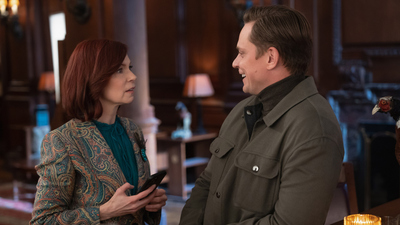
The Unfinished Symphony: When Preston Whispers of Ullman’s Return to Elsbeth
In the whimsical, often surprising world of Elsbeth, where a New York City setting is painted with the pastel hues of a character-driven, cozy mystery, one performance in the pilot episode stood out with a particular, unforgettable sparkle. That was, of course, Tracey Ullman as Rita, the enigmatic, Pilates-teaching suspect whose brief appearance was a masterclass in comedic timing and character creation. Now, the quiet hum of fan desire has amplified into a tantalizing possibility, as showrunner Jonathan Tolins has reportedly made his wish known: Tracey Ullman could, and perhaps should, return. This isn’t just a casting wish; it’s a creative endorsement, a recognition of an unfinished symphony whose most captivating note still awaits its reprise.
To speak of Tracey Ullman is to invoke the spirit of true theatrical alchemy. She is not merely an actress but a chameleonic force, a comedic genius capable of shedding her own skin to inhabit the peculiar cadences and eccentricities of a thousand different characters. From the myriad voices of her sketch comedy empire to the subtle nuances of her dramatic turns, Ullman’s hallmark is her utterly convincing immersion. When she graced the screen as Rita in Elsbeth‘s inaugural outing, she didn’t just play a suspect; she became a delightful, slightly unhinged counterpoint to Elsbeth Tascioni’s own unique brand of observant eccentricity. Rita, with her rigid dedication to wellness and her thinly veiled disdain for disruption, was the perfect comedic foil, a kinetic, unpredictable element that not only grounded the pilot’s central mystery but also instantly defined the show’s playfully off-kilter tone.
Her performance was a lightning strike – brief, brilliant, and leaving an indelible afterimage. The chemistry between Ullman’s Rita and Carrie Preston’s Elsbeth was immediate and electric, a dance of opposing but equally compelling forces. Elsbeth, with her disarming earnestness and seemingly flighty demeanor, found a surprising mirror, and perhaps a formidable adversary, in Rita’s precise, self-assured world. It’s this unresolved dynamic, this hint of a deeper, stranger relationship, that makes Tolins’s expressed desire for her return so potent. It suggests not just a reunion for reunion’s sake, but a recognition of a creative spark that deserves further exploration.
Preston’s wish for Ullman’s return is more than just a casting director’s fantasy; it’s a strategic nod to the show’s inherent strengths. Elsbeth thrives on its character interactions, its ability to find humor and heart in the most unexpected places. Bringing back Rita wouldn’t be mere stunt casting; it would be an organic expansion of the show’s already rich tapestry. Imagine the possibilities: Rita, not merely a suspect, but a recurring thorn in Elsbeth’s side, perhaps even an unwitting ally, or a source of peculiar information. The humor would derive not just from their initial clash, but from the evolving, perhaps begrudging, respect that could develop between two such singular personalities. Their interactions could provide a fresh lens through which to view Elsbeth’s investigative process, challenging her in ways that only a character as distinct as Rita could.
Furthermore, Ullman’s potential return underscores the power of a perfectly cast recurring role. In a television landscape often reliant on formula, Elsbeth stands out through its commitment to quirky, memorable characters. Rita, as embodied by Ullman, isn’t just a plot device; she’s an experience. Her return would serve as a powerful signal to audiences that the show intends to double down on its unique brand of character-driven storytelling, promising more of the unexpected joy that makes Elsbeth so endearing. It’s the promise of an unfinished joke finally reaching its punchline, a delightful mystery given another layer of delightful complexity.
Ultimately, Jonathan Tolins’s wish for Tracey Ullman’s return to Elsbeth is a beacon of hope for fans and a testament to the impact of exceptional talent. It speaks to the recognition that some characters, even in fleeting appearances, leave an undeniable mark, embedding themselves in the show’s DNA. If the stars align and Ullman indeed steps back into Rita’s impeccably tailored athletic wear, it wouldn’t just be a triumphant return; it would be the completion of an artistic circle, adding another layer of irresistible charm and inimitable comedic genius to the vibrant, peculiar world that Elsbeth so beautifully creates. The symphony awaits its next, most anticipated movement.
